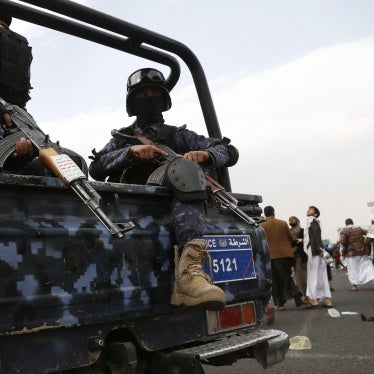Hong Kong is fast approaching July 1, when British colonial rule ends and the territory becomes a Special Administrative Region (SAR) of the People's Republic of China. Among the people left in Hong Kong after the British depart will be some 12,000 Hong Kong prisoners, including some 800 foreign nationals. Human Rights Watch/Asia and the Hong Kong Human Rights Monitor, recognizing that few if any groups are more vulnerable to the impact of political change than prisoners, recently investigated conditions in the Hong Kong prison system with the intention of establishing a benchmark of prison conditions prior to the territory's reversion to China. In Hong Kong: Prison Conditions in 1997, published today, the two groups offer a comprehensive appraisal of the state of the territory's prisons.
On the whole, the report concludes, the Hong Kong prison system has much to recommend it. In particular, the territory's prisons are administered by an extremely competent and professional corps of correctional officers. Under their vigilance, the prisons are relatively safe and secure, and serious physical violence is a rare occurrence. The physical infrastructure of the prison system is, with the exception of a couple of facilities, in very good shape. The Prison Rules that regulate the operation of the prisons, particularly after their recent amendment, reflect a healthy concern for prisoners' fundamental rights.
The international delegation conducting the investigation, which was the first full examination of the system by independent nongovernmental organizations, included Sir Stephen Tumim, the U.K.'s former Chief Inspector of Prisons, Joanne Mariner, a Human Rights Watch prisons expert, Law Yuk Kai, the director of the Hong Kong Human Rights Monitor, and Robin Munro, China expert at Human Rights Watch/Asia.
Given China's notoriously poor prison conditions and its frequent use of capital punishment, it is unsurprising that some Hong Kong prisoners have already expressed grave apprehensions regarding their treatment under Chinese rule. In light of these concerns, the investigation--besides establishing a benchmark of prison conditions--was also meant to establish a precedent of independent monitoring of the territory's prisons, to encourage future monitoring.
As the report explains, the Hong Kong prison system is less than exemplary with respect to a few important issues. Overcrowding, which is a problem now and, according to official estimates, will be continue to be problem for the foreseeable future, has stretched the system's resources. At the majority of the twelve facilities visited by the delegation, cells and dormitories were crowded, and many activities were tedious and not conducive to rehabilitation. Cotton ball and envelope-making, for example, tasks assigned in many facilities, hardly equip inmates with the skills necessary to find employment upon release. The combination of greater overcrowding and less meaningful ways of passing the time also aggravates the tensions which result in inmate-on-inmate violence.
The report notes that the strains of overcrowding are particularly evident with regard to unconvicted prisoners--prisoners who are presumed innocent and are supposed to be treated as such. In particular, the unremitting idleness of such prisoners, a problem that the delegation observed in every facility that houses them, is of serious concern.
The report also explains that the Hong Kong prison system maintains unnecessarily stringent controls over inmates' contacts with the outside world. Among their adverse effects, these restrictions bode poorly for prisoners' future readjustment back into society, when they will need the social connection of family and friends. For many prisoners, visits are too infrequent and too short. Moreover, prisoners in higher security facilities, who are only allowed "closed" visits, are separated from their visitors by a plexiglass barrier and must speak to them via a telephone/intercom system. The resulting ban on all personal contact does have the intended effect of keeping out drugs and other contraband, which are at the root of many serious problems in other prison systems, but it exacts a high cost, particularly in relations between parents and their children.
, Hong Kong: Prison Conditions in 1997 describes and evaluates the treatment of prisoners confined in Hong Kong prisons with reference to the relevant provisions of binding international human rights treaties, and to other authoritative international standards. Among its detailed recommendations for improving the Hong Kong correctional system are the following:
Steps should be taken to ease overcrowding throughout the prison system.
Following the model of the United Kingdom, the Hong Kong government should establish an independent prisons inspectorate with a broad mandate to investigate conditions in the territory's penal facilities; report its findings to the responsible governmental authorities, to the legislature, and to the public; and make recommendations for reform.
As is common in prisons around the world, remand prisoners in Hong Kong are subject to the worst conditions. The Correctional Services Department (CSD) should take immediate steps to improve their treatment by alleviating overcrowding at the Lai Chi Kok Reception Centre and at Tai Lam Centre for Women, by allowing prisoners out of their day rooms more frequently, and by making greater work, recreational and educational opportunities available to them.
The Hong Kong government should take immediate steps to improve the conditions of detention centers holding Vietnamese asylum-seekers.
The CSD should take urgent steps to recruit and train the necessary quota of psychiatric nurses to staff Siu Lam Psychiatric Centre.
Consistent with the practice in other highly industrialized countries, the CSD should expand prisoners' access to telephones by installing telephones in areas accessible to prisoners and establishing appropriate rules for their use.
The CSD should relax restriction on visits. It should routinely allow prisoners--especially those whose relatives must travel long distances to see them, or whose relatives, because of age or disability, have difficulty traveling--visits of at least an hour. It should also expand its use of open (contact) visits.
Because prisoners' ability to find work upon release into the community is an important determinant of their likelihood to commit future crimes, the CSD should take greater care to provide work opportunities that help prisoners gain marketable skills.






